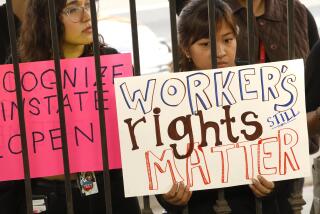Top Curator Reinstated at Natural History Museum : Labor: Hearing officer rules that the layoff in January of David P. Whistler violated Civil Service regulations.
- Share via
A top curator who was laid off from the Los Angeles County Museum of Natural History earlier this year was reinstated Friday after a Civil Service Commission hearing officer found that he was terminated in violation of Civil Service seniority rules.
David P. Whistler, 53, curator of vertebrate paleontology until he was laid off Jan. 15, signed a settlement agreement that restored him to his post at the museum in Exposition Park, where he had been employed for 22 years.
The agreement must still be signed by the county counsel’s office and the museum, but a museum representative said Whistler is to be reinstated as soon as the document is received. He will receive back pay on his salary of about $55,000 a year and all benefits will be reinstated retroactively.
The agreement was reached after Mark Burstein, a Civil Service Commission hearing officer, issued a written recommendation in which he said the evidence in Whistler’s case, which was presented at a hearing in May, “vividly established the reasons for Civil Service protection.”
Burstein found that museum Director Craig C. Black had broken Civil Service rules when he laid off Whistler, who had more seniority than other employees who were not terminated. Although Whistler’s layoff would have been allowed if it was deemed “in the best interests of the service,” Burstein found that Black had made no such justification.
Burstein found no evidence of age discrimination, which Whistler had alleged. Burstein also found that Whistler failed to prove that he had been targeted for dismissal because he was a whistle-blower. But Burstein said he believed that the museum director had made “self-serving” conclusions about Whistler and had let anger unduly influence his decisions.
“Although Dr. Black denied being angry, he admitted that (Whistler) upset him and went to the center of his ‘guts’. A more visceral reaction could hardly be imaginable,” Burstein wrote. “Based on the totality of the record, I do not credit Dr. Black’s testimony and, further, I conclude that his testimony was an attempt to mask a motive of retaliation against (Whistler).”
Burstein’s report was an assessment of testimony given by Whistler, Black and others at the May hearing. Whistler and others testified that he was pressured into taking early separation after an angry confrontation with Black. According to testimony, museum administrators told Whistler that if he did not leave voluntarily, he would lose both his job and $72,000 that was part of a county separation package.
“It is hard to imagine a scenario where an employee would be subjected to more duress. . . ,” Burstein wrote in finding for Whistler.
Whistler had testified that Black was angry about a letter that he had written to his attorney, Gordon Isaac, in which he criticized Black. Whistler’s supervisor, Lawrence G. Barnes, also testified that Black had told him several times that he was angry about Whistler’s letter--an assertion that Black denied.
In his recommendation, Burstein noted that Black’s decision to lay off Whistler “came within hours of the time when he learned of (Whistler’s) letter. While the timing of these two events could have been purely coincidental, based upon Dr. Black’s testimony . . . I conclude that there was some cause-and-effect relationship.”
Burstein also noted that Black’s testimony on one detail--when exactly Whistler decided to take early separation--contradicted the testimony of all the other witnesses.
“It appears that Dr. Black’s testimony was driven by some factor other than faulty memory,” Burstein concluded.
Black, who has announced that he will retire within the coming year, was on vacation and could not be reached for comment.
But Catherine Krell, deputy director for marketing and public affairs for the museum, denied that the museum had treated Whistler unfairly. “There was no maliciousness or intended maliciousness at all,” she said.
More to Read
The biggest entertainment stories
Get our big stories about Hollywood, film, television, music, arts, culture and more right in your inbox as soon as they publish.
You may occasionally receive promotional content from the Los Angeles Times.










